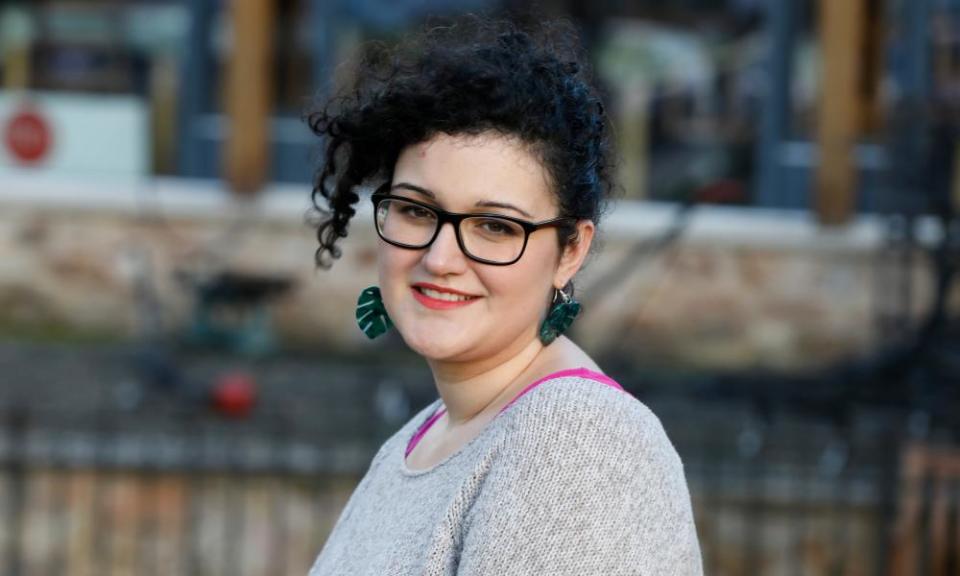Grief, needle phobia, lack of trust: why we refused Covid jabs – and what changed our minds

The UK’s vaccine rollout has largely been a success: more than 90% of the population aged 12 and over has now had at least one dose, with just over half having had a second dose and the booster.
However, there are thousands of people who still haven’t had a jab, despite estimates suggesting that 90% of the most severely ill Covid patients in hospital at the moment are unvaccinated.
A number of strategies are being employed to convince those who have so fare avoided it get vaccinated, with outreach groups and GPs working to encourage take-up.
The Observer spoke to three people who have, in recent weeks, changed their minds. Here, they explain their initial hesitancy and the reasons for their change of heart.
Jess Haghkerdar, 32
PhD student, Fife
Ecology student Jess said she “wasn’t against the vaccine” and had received her first and second doses. But she had decided not to get the booster. In August 2021, shortly after having her second jab, she had a miscarriage at eight weeks pregnant. “I was worried the vaccine had contributed to my miscarriage and became wary of getting a booster once I found out I was pregnant again” she said.
She considered waiting until she had given birth to have her booster, but the became concerned about Omicron and about the number of unvaccinated pregnant women ending up in intensive care.
“I realised that my hesitance was based on grief and worry,” she said. “Just looking at the data proved that Covid is a much greater risk than any of my worst fears about the vaccine affecting my pregnancy.”
She changed her mind and had the booster. “I don’t want to get Covid while I am pregnant and be in a situation that could potentially be harmful to me and the baby.
“I’m a scientist and I know that if there was something seriously wrong with the vaccines, fellow scientists would stop at nothing to discover it and improve our understanding of them.
“I understand the visceral response and fear of vaccination, but we need to be realistic about how serious Covid can be and recognise how hard scientists and doctors have worked to keep us safe. No matter how I look at it now, getting vaccinated is worth it.”
Kevin Buckland, 46
PhD student and university lecturer, Sutton Coldfield
Kevin has had a phobia of needles from an early age. “I just hate them. I forged my mum’s signature when I was 14 to avoid getting the TB vaccination, saying she didn’t want me to have it. They wrote to her six months later, I was found out, and they dragged me into Birmingham kicking and screaming to have it.”
His plan was to remain unvaccinated, taking precautions to avoid infecting himself and his elderly parents, who live nearby.
The emergence of the Omicron variant made Kevin reassess his approach, as he was concerned by its rate of transmission. “I was reading that just a whiff of an infected person’s breath would be enough to contract it. I’ve dodged it for this length of time and thought, how much longer can I go on?
“I booked an appointment about a month ago and chickened out. I then rearranged that one and finally went along. I just concentrated on the fact that it was a good thing. I hardly slept the night before.
“On the day, I didn’t even realise she had done it. It helped that I walked into the place not wearing glasses so I couldn’t see anything anyway. There was one person taking my details, the other had a hypodermic needle.
“I was talking to the one with a laptop about my phobia and, without me noticing, it was done. I didn’t feel a thing. I have my second booked for February and plan to get a booster.”
Adam, 26, from Cheshire
Adam (not his real name) lost faith in the government in 2020, largely because of Dominic Cummings and the Barnard Castle affair.
“I just thought if they can lie about something of this magnitude, what else can they lie about?”
He then became sceptical because of the speed of the vaccination programme rollout.
“I felt like it was quite rushed to begin with. There wasn’t much research published or data coming out, which led me to believe that it was being pushed out for other reasons – not just to save lives, but to save the economy, which to some extent I understand, but I feel like saving lives is much more important. Damage to the economy can be repaired, but you can’t bring back someone who has passed away.”
Over time Adam, who works for his family’s wealth management business, came to believe in the benefits of vaccination by following hospitalisation figures in trusted news sources.
Related: What do we know about the Omicron Covid variant so far?
“I was hesitant about getting my first vaccine, which I didn’t have until about three months ago. I had my second dose three weeks ago.
“The hospitalisation numbers for people who were vaccinated compared with people who were unvaccinated were scary. At the same time, I felt like there was a bit more control on the misinformation that was being put out there.
“The information that was published was worrying, so I thought it was best in the long run to get the vaccine, rather than not, despite what my feelings were at the time.”

 Yahoo Finance
Yahoo Finance 